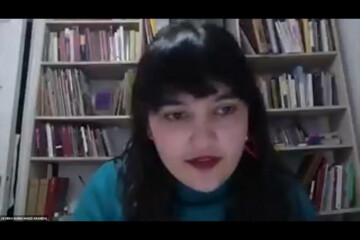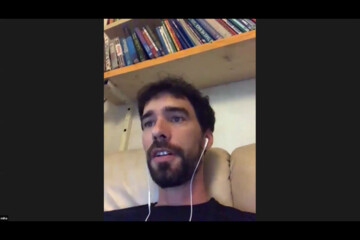The above title(s) are a paraphrase of a newspaper column, “I, a Communist”, by the late journalist Jurij Gustinčič.[1] It was published in the weekly Mladina in 2002. I am mentioning this case as an example of an engaged position in times when declaring that one was a communist was not favoured public, political or personal stand in the post-socialist state of Slovenia.
So the first point that I am going to talk about is about history. One of the key issues or as it seems “unresolvable” problems of our current times is precisely the “problem” with history. Many have written about it – who has the right to history, by whom is the history constructed (history from above, from below), what kind of positions are taken within history, how to deal with historical negationism, with revisionism, etc. This has been even more evident in the past months, with the pandemic and all the consequent restrictive measures that happened in the countries affected, turning the political discourse/orientation towards the right or even extreme right, at the same time bringing forward issues of racism, colonialism, new and old forms of fascism and so on. As we know history is dynamic, history is a discipline of critical thinking, it is transnational… but what is important is the distinction between “historical revision” (which means creating new knowledge, discovering new historical sources and interpreting them) and “historical revisionism” (manipulation of historical facts to achieve a political goal).
Since the 1990s the revisionist attempts at changing the accepted historical facts – mainly about the Partisan resistance and the role of communists during the Second World War – have been more and more widespread, especially in the former Yugoslavia and Eastern Europe. This “narrative” claims that the → anti-fascist parties and especially the Communist Party (Yugoslav, Italian, etc.) had, as David Broder writes in Jacobin, “institutionalised their own myths as official history while silencing those who dared to question their authority”[2]. So as a consequence, the “new” historical perspectives were written and legitimised by revisionist historians, causing, among other things, the resurrection of the right and extreme right in many countries around the world. We can place in this context the resolution “Europe must remember its past to build its future”[3] adopted in 2019 by the European Parliament. This resolution is dangerous as it condemns communism as equivalent to Nazism, and in this way opens the door to “criminalising” contemporary anti-fascist movements. It is a pity that this resolution has not received more criticism and public response. → Solidarity with this kind of anti-fascist history has unfortunately been omitted.
Altogether different is a recent declaration called “Defend History!”[4] written by a group of historians from the countries of the former Yugoslavia. It emphasises another danger coming from historical revisionism: that revisionism is enabling the continuing of the Yugoslav Wars of the 1990s by other means. These wars are also becoming subject to political manipulation, just like the Second World War.
Slovenia is not an exception in all this, and in March 2020, at the beginning of the pandemic, the main right-wing party returned to political power, leading the country towards Hungary-style Orbanisation. Since then every Friday there have been protests around Slovenia where thousands of cyclists and pedestrians take to the streets. The government used the pandemic to restrict freedoms, to increase police powers, incite hostility to migrants, sacrifice the elderly (as old people sick with COVID were not sent to hospitals), attack critical media, culture, etc. What is especially dangerous is the tendency towards cultural homogeneity, with anti-immigrant sentiments being one of the main “arguments” of their nationalism. Historian Božo Repe, in his recent text on the political situation in Slovenia, asked: “At what point of transition to fascism are we today?”[5]
Looking back to the 1920s, 1930s and the rise of fascism, the new political situation does not come as a surprise, as it was not really a surprise to read Trump’s tweet on 31 May 2020 that the USA will be designating Antifa as a terrorist organisation. This demonisation of anti-fascism, and proclaiming the movement as “alt-left”, is dangerous as it relativises fascism.
But the core of fascism today lies in neoliberalism. Tomaž Mastnak[6] wrote an excellent analysis in a newspaper column from today. He basically warned the left that an alliance with neoliberalism against fascism means at the same time an alliance with the forces of the system that gives rise to fascism. Fascism will not be stopped this way. What we should do instead is start changing the system.
But changing the system is not easy. How to even start doing so, how do we take a stand (think of Gramsci’s text “I Hate the Indifferent” as a source of inspiration), and how do we actually become part of the movement, and resistance? I think other authors in this volume will discuss some of these aspects more thoroughly. Just to give an example: Arundhati Roy in a recent interview pointed out that the best way (and the starting point) of supporting the movement is to understand where it comes from: the history of slavery, racism, the civil rights movement, and I can also add the history of fascism and neoliberalism to the list.
But the basis for all political action and engagement is solidarity. The usual interpretation is that solidarity requires a shared political aim, a collective action for justice. De-colonising solidarity (Fernanda Carvajal, for example, writes about this) proposes a new, horizontal format as a tool for promoting mutual relationships among peoples. A different concept of solidarity is a definition by Avery Kolers[7]. He says that solidarity is when you act alongside the other even if you think they are wrong, so you act on their behalf. Solidarity can then be defined as “political action on others’ terms”. It is not about justice, but about treating people justly.
Perhaps in this line of thinking I will end with another concept, that of → empathy. Empathy that is not empathy from above, not pity or sympathy, nor Christian love, but empathy as a basis for a new kind of political solidarity that could reach across racial, class, gender, and intergenerational lines, as well as across different human and non-human species. Empathy understood in line with the → hapticality of Kike’s presentation or in the way Manuel Borja-Villel put it in his introduction: “of being present in the other”.
I, an animal, I, a poor person, I, a sick person, I, a refugee...






